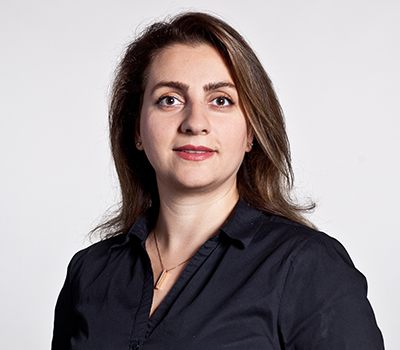New research guides small businesses into the world of blockchain
Small businesses account for a large portion of jobs and innovation in society. But how can they benefit from blockchain technology, which is often associated with large corporations? In her dissertation, Zara Zamani, a PhD student at Halmstad University, presents a framework that helps small businesses succeed in blockchain adoption in an ever-changing digital landscape.

“Blockchain isn’t just about technology. I believe blockchain is more about the underlying philosophy. It’s a way to increase transparency, inclusion and sustainability in society.”
Zara Zamani, PhD student
Blockchain is a technology often associated with cryptocurrencies and major global companies. However, research suggests that it also offers potential to change working methods for small and medium-sized enterprises (SMEs). Zara Zamani, a PhD student at Halmstad University, has researched how small businesses can approach blockchain adoption and what enablers and challenges they might face along the way.
“Many small businesses perceive blockchain as too complex or costly and view blockchain adoption as a static event that starts and ends. However, my research shows that it is a process that is dynamic. In my dissertation, I present a framework that guides SMEs through a multistage approach to successful blockchain adoption”, says Zara Zamani.
Her research was conducted in four main phases: a literature review, an in-depth look at pre-adoption factors, an analysis of the implementation stage and an exploration of the dynamic interplay between technology and the environment.
These steps culminated in a new framework – Dynamic Technology Adoption Model for SMEs (DTAM-SMEs) – which guides companies through the process of evaluating and implementing blockchain technology. The model helps companies tackle obstacles such as technical complexity, costs and organisational changes.
Adaptation in a changing world
One of Zara Zamani’s key findings was that SMEs approach blockchain through a multi-stage process, yet this process is far from linear. Instead, it is constantly evolving—shaped by rapid technological advances, shifting regulations, changing market demands and competitive pressures. The proposed framework seeks to enable SMEs to effectively consider technological and environmental changes during the adoption of blockchain technology.
“It’s not just about implementing the technology once. You have to continually adapt, staying alert to new regulations, technical developments and the needs of the market”, says Zara Zamani.
To succeed, it is vital to collaborate with partners, technical experts and other stakeholders. Zara Zamani emphasises that small businesses do not need to do everything on their own – there are resources and partnerships available for support.
From theory to practice

Zara Zamani defended her doctoral thesis in January 2025.
Zara Zamani has worked with several industry partners, including DH Anticounterfeit, MetaBytes, ChromaWay, and 4+Ventures. These collaborations have helped ensure that the framework reflects real-world conditions for smaller companies.
“Blockchain isn’t just about technology. I believe blockchain is more about the underlying philosophy. It’s a way to increase transparency, inclusion and sustainability in society”, says Zara Zamani.
Through her research, she aims to enable more SMEs to benefit from blockchain, boosting efficiency, innovation and competitiveness. The technology can, for example, reduce the risk of counterfeiting, provide more secure supply chains, and facilitate smarter business processes.
Future research
Zara Zamani came to Halmstad University in October 2018, attracted by the Univeristy’s focus on innovation and collaboration. Her next step is to study how blockchain can be combined with artificial intelligence to further expand the possibilities for decentralised and secure solutions.
“I want to contribute both theoretically and practically. Research makes the greatest difference when it can be applied directly in real-life contexts”, says Zara Zamani.
Text: Lovisa Essunger
Photo: iStock, Magnus Karlsson

